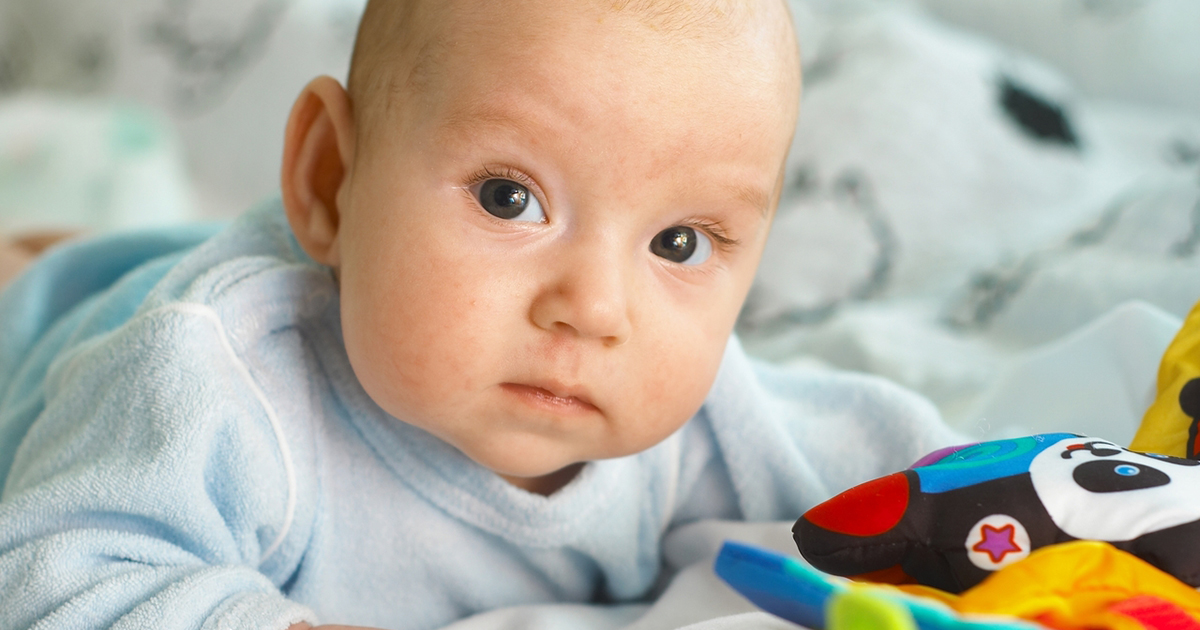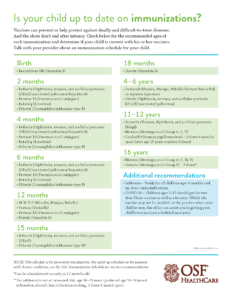
Tips for your newborn’s vaccine schedule
Your newborn baby’s vaccine schedule is more than just another checklist. It’s an important part of their healthy growth and development.
What vaccines does my baby need?
The types of vaccines used to protect your baby are safe, effective and have been used to protect generations of people.
Polio vaccine
Polio is a disease that used to paralyze and take the lives of thousands of children every year. Thanks to the polio vaccine, this disease has been eradicated. But it’s important to get your baby vaccinated against polio to keep this disease eradicated.
Influenza vaccine
The flu is a respiratory virus that can cause serious complications, especially for children. It can lead to pneumonia, myocarditis or sepsis, which can be life-threatening to children.
Hepatitis B vaccination
Hepatitis B is a virus that destroys the liver. This is one of the few vaccines your baby receives at birth.

Is your child up to date on vaccines?
Get the download
Hepatitis A vaccine
Hepatitis A is an infectious disease that affects the liver. It often has no symptoms, and can be especially life-threatening to children.
Hib vaccine
The hib vaccine protects against haemophilus influenzae type b, which can cause a serious infection of the brain and spinal cord.
MMR vaccine
This vaccine prevents measles, mumps and rubella. These diseases cause severe swelling of the brain and salivary glands.
Pneumococcal vaccine
This vaccine protects against a virus that causes meningitis, pneumonia and ear infections.
Rotavirus vaccine
Rotavirus causes diarrhea, vomiting and dehydration in infants.
Varicella vaccine
This vaccine protects against chickenpox.
DTaP vaccine
The DTaP vaccine is a combination vaccine that protects against diphtheria, tetanus and whooping cough. All of these diseases cause serious consequences in children, especially difficulty breathing and throat swelling.
COVID-19 vaccine
Children are more susceptible to developing severe outcomes from COVID-19, such as pneumonia.
When do babies get shots?
A baby shot schedule is something to discuss with your pregnancy care providers and your baby’s pediatrician. They’ll help you to set up an infant shot schedule that makes you feel comfortable and protects your baby to the maximum.
Babies start getting their vaccinations at birth. Most of them are spread out over the first 18 months of life.
The infant vaccination schedule is important
At birth, babies have immature immune systems with the exception of antibodies they receive in the womb from their mother. Those antibodies might only protect a baby from diseases for the first six months. That’s why it’s important to follow the recommended vaccination schedule from your child’s doctor.
OSF Medical Group offices follow the Centers for Disease Control and Prevention (CDC) vaccination schedule that has been carefully researched and studied to give your baby the best protection against these potentially deadly diseases.
Baby immunization schedule: Vaccines by age chart
Most babies receive their first vaccinations at two months of age. The only exception is the HepB vaccine. The first dose of the Hep B vaccine is given at birth and the second is given between one and two months.
At two months, your baby will receive vaccines for:
- Rotavirus
- Diphtheria
- Tetanus
- Whooping cough
- Meningitis secondary to Haemophilus Influenzae Type B (Hib)
- Pneumococcal disease
- Polio
Most of these vaccines are given in more than one dose. Your baby will get their second dose of each of these vaccines at four months.
At six months, your baby will receive third doses of vaccines for:
- Hepatitis B (can be given anytime between six months and 18 months)
- Diphtheria
- Tetanus
- Whooping cough
- Pneumococcal disease
- Polio (can be given anywhere between six months and 15 months)
In addition, your baby can also get the COVID-19 vaccination in a two or three dose series starting at six months.
Between 12 and 15 months, your baby will receive third or fourth doses for:
- Influenza
- Diphtheria
- Tetanus
- Whooping cough
- Hib
- Pneumococcal disease
- And first doses of vaccines for:
- Chicken pox
- Measles, mumps and rubella
- Hepatitis A
Your baby will receive a fourth dose of the DTaP vaccine between 15 and 18 months.
Between four and six years of age, your child will receive vaccines for the following illnesses. These are often known as the kindergarten shots.
- Measles, mumps and rubella
- Polio
- Diphtheria
- Tetanus
- Whooping cough
- Chicken pox
Children age 11 to 18 years should get vaccines for:
- Meningococcal
- HPV (if recommended by your child’s pediatrician)
Children and teens should also get the flu vaccine each year and any additional COVID-19 booster doses your pediatrician recommends.
Benefits of vaccines far outweigh the side effects
The vaccines available today have been thoroughly tested and studied by medical professionals to make our vaccines safe and effective for our communities. According to the CDC, the United States has the safest, most effective vaccine supply in its history.
As with any medicine, vaccines can cause side effects, but they are generally very mild. The side effects can include redness or swelling at the injection site or a low-grade fever.
However, the side effects are mild compared to the side effects of vaccine-preventable diseases, like whooping cough.
Like the smallpox disease that was completely eliminated in 1980 by vaccines, if we continue to immunize, we will continue eliminating deadly diseases that still exist today.